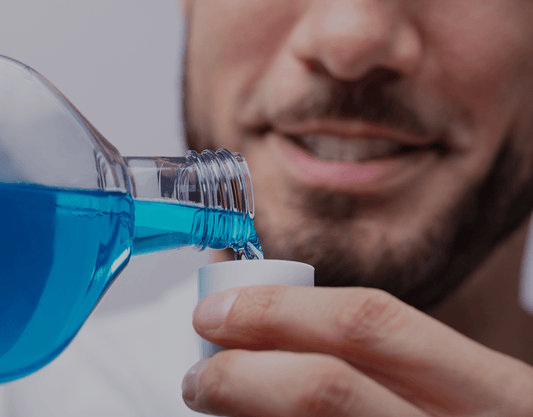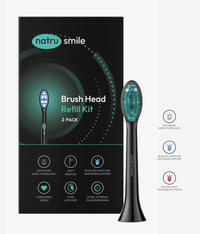
All products are certified by dental expert Dr. Greg Grillo
For many, mouthwash is a staple for oral health. When used correctly, it can help reduce plaque and bacteria and freshen your breath. Some mouthwashes are even used for whitening, treating canker sores, and managing dry mouth.
But if mouthwash is an addition to your routine you don't necessarily stick to every day, you might wonder whether or not it works after a certain amount of time.
In this article, we'll discuss the shelf life of mouthwash, how to properly use it, and when to throw it out and replace it with a new bottle.
Understanding Of Mouthwash Expiration Dates: Overview
When you purchase mouthwash at the store, you might notice a small expiration date printed on the bottle. But that doesn't mean the same thing as other expiration dates you may be familiar with.
Mouthwash is categorized as a drug—a product that's intended to diagnose, cure, treat, or prevent any disease. That means the date printed on the bottle is actually an expiration date for the drug ingredients, not for the entire contents of the bottle.
Consumer Reports clarifies that food expiry dates aren't regulated, but the FDA does regulate expiration dates for drug and cosmetic products (which include mouthwash).
The FDA emphasizes that cosmetics regulated as drugs are specifically formulated to treat or prevent an illness. So, it's absolutely essential for cosmetic manufacturers to examine the stability of their products and include a printed expiration date on the packaging.
In other words, when you read a mouthwash expiration date, it only applies to certain components in the formula and how long they will work effectively. The expiration date does not necessarily mean that the mouthwash is dangerous to use after that time period (as it would for food).
Does Mouthwash Expire?
In order to understand the shelf life of your mouthwash, it's important to look at the ingredients listed on the bottle. Mouthwashes can be grouped into two main categories: cosmetic and therapeutic.
Cosmetic Mouthwash
Cosmetic mouthwash is the type of mouthwash you see at most stores. People use it to mask bad breath, improve the look of their mouths, and promote oral hygiene. However, it cannot correct dental issues like gum disease, enamel wear, tooth decay, plaque buildup or dry mouth. For tackling these specific problems and achieving optimal oral health outcomes, a therapeutic mouthwash is your best bet.
Even though the FDA doesn't regulate cosmetic mouthwashes, you should still be aware of when they expire. Often, if left on your bathroom shelf for too long, a cosmetic mouthwash will lose its quality.
Therapeutic Mouthwash
Therapeutic mouthwash contains FDA-regulated ingredients like hydrogen peroxide, fluoride, chlorhexidine, and cetylpyridinium chloride. These ingredients are responsible for counteracting diseases and preventing plaque buildup, tooth decay, and other oral issues.
If you have a therapeutic mouthwash in your bathroom, its expiration date is more critical. Most therapeutic mouthwashes have an expiration date of up to two years, and you won't want to use one that doesn't work as intended.
Is It Safe To Use Expired Mouthwash?
"Safety" might be the wrong factor to describe expired mouthwash. While it may not necessarily be dangerous, it also won't have the intended effect. If the ingredients in your mouthwash won't whiten or protect your teeth, using it won't do you any good.
Beyond the potential for lack of effectiveness, experts explain that once the ingredients stop working, the solution becomes watered down. Instead of benefitting your teeth, this watered-down mixture can actually promote bacteria growth and do more harm than good.
What Happens If You Use Expired Mouthwash?
The implications of using expired mouthwash largely depend on the frequency with which you do so.
If you accidentally use expired mouthwash a few times, you don't necessarily need to worry. Just like smoking cigarettes, drinking soda, or anything else potentially harmful to your teeth, a few uses won't be able to make much of a difference.
That said, it also won't do anything positive for your oral health. It won't fight cavities, eliminate bad breath, or whiten your teeth. To use expired mouthwash would be a waste of time and energy.
After the expiration date of a non-alcohol-based mouthwash, there is also an issue with the safety of its chemicals. If the chemicals haven't yet been rendered useless, they could still corrode the plastic in the bottle, causing it to seep into the mouthwash and be consumed when used.
How Should You Dispose Of Expired Mouthwash?
If you have old mouthwash on your hands, you might wonder how to get rid of it properly. Healthline experts indicate that the disposal process is as simple as pouring it down the drain.
After you pour the liquid out of the bottle, rinse it down the drain with water to clear your sink and recycle the empty bottle.
Although it may seem wasteful and a bit of a hassle, disposing of expired mouthwash is the best way to ensure that you're not doing more harm than good when it comes to your oral hygiene routine.
Expired Mouthwash Side Effects
There are many side effects of using mouthwash, and they apply to regular and expired mouthwash alike. There are additional side effects as well that stem from using expired mouthwash.
Common side effects of regular and expired mouthwash include:
Dry Mouth
Dry mouth is one of the most common side effects of using mouthwash. Since the alcohol or chemicals in the mouthwash work to eliminate bacteria, they can also act on other cells that shouldn't be eliminated.
These cells produce saliva naturally, so when they are eliminated, the amount of saliva produced decreases drastically.
Using expired mouthwash could potentially worsen this condition as the potency of its ingredients will have diminished over time. It can also lead to an overgrowth of bacteria in the mouth due to the fact that it is no longer able to prevent bacteria growth.
Tooth Sensitivity
Another common side effect of using mouthwash is tooth sensitivity. This can be caused by the ingredients in the mouthwash, including alcohol and other chemicals, irritating the teeth or drying out the gums.
If your mouthwash is expired, you might not notice much of a difference in terms of tooth sensitivity as the ingredients have likely reduced in potency.
Irritation And Burning
Mouthwash can also irritate and burning in the mouth. This is because alcohol or other chemicals may irritate sensitive tissues, such as the gums, tongue, or cheeks. If your expired mouthwash is still potent, it could cause a similar reaction.
However, if the ingredients have weakened over time, it will likely be less potent and therefore cause less irritation and burning in the mouth. Still, expired mouthwash can cause mouthwash burn that results in canker sores, redness, and localized irritation.
If the chemicals in your mouthwash touch your skin, throat, or areas around your mouth, they may also cause irritation and burns around those areas.
Gastrointestinal Issues
The alcohol or chemicals present in mouthwash can disrupt the natural balance of the GI tract and lead to abdominal discomfort or other digestive issues.
Using expired mouthwash may leave the GI tract more susceptible to these problems as it will have a weaker potency than when first purchased.
Remineralization
Mouthwashes that contain fluoride can help remineralize teeth, which is essential for maintaining healthy teeth and gums.
However, using expired mouthwash could reduce the amount of fluoride present in the solution, thus reducing its ability to properly remineralize the teeth. If the fluoride in your mouthwash is no longer effective, the other ingredients in the solution can work against your regular oral hygiene routine, leading to an increased risk of cavities or other dental problems.
Want to learn more? These are the questions our customers ask us the most.
Can Expired Mouthwash Hurt You?
In most cases, expired mouthwash cannot hurt you. It can, however, become less effective overtime and be unable to provide the same level of protection that a new bottle would. After about two years, it is best to replace your mouthwash with a new one to ensure the best possible oral hygiene.
Is It Bad To Use Expired Mouthwash?
Using expired mouthwash isn't always bad, but it is never a good idea. At best, it would do absolutely nothing for your oral health. And at worst, it could cause irritation or other side effects. Since mouthwash is a product used for oral care, there is no point in using it if it does not provide the results you are looking for.
Does Mouthwash Expire If Unopened?
Mouthwash is usually safe and effective two to three years after its manufacture date. This means that even if the bottle is unopened, it should still be replaced after that time. The astringent in mouthwash (e.g., alcohol) will begin to dissolve after that time, making it potentially unsafe to use for oral care.
When Does Mouthwash Expire?
Most mouthwash expires between two and three years after the date of manufacture. It's best to check the expiration date on the bottle or discard it after two years if there is no expiration date. Even if the mouthwash has not been opened, it should be replaced after two years due to a reduction in potency and effectiveness.
Can Expired Mouthwash Be Used?
Expired mouthwash should not be used. It is not as effective (if at all) and can irritate the mouth, throat, and skin. In some instances, it is also potentially harmful. It is best to replace the mouthwash after two years or when the expiration date has passed.
Where Is The Expiration Date On Mouthwash?
Somewhere on your mouthwash bottle, you will notice a stamped date that indicates when the product was manufactured. This is typically located on the bottle's back label or under the cap. In some cases, manufacturers also stamp it directly on the bottle.
Does Alcohol-Free Mouthwash Expire?
All types of mouthwash expire after two to three years. Non-alcoholic mouthwashes contain many other ingredients that can become ineffective over time, seep into the plastic of the bottle, or cause other forms of contamination. It is in your best interest to discard mouthwash that has expired.
What Should I Do With Expired Mouthwash?
Properly discarding old mouthwash is essential. Expired mouthwash should be poured down the drain and its bottle should be recycled. The disposal process for expired mouthwash is relatively straightforward and does not require you to take any additional steps.
How Long Is Mouthwash Good For After The Expiration Date?
The expiration date on a mouthwash bottle is a guideline that indicates when the manufacturer estimates the ingredients will become inactive. This creates some gray area when it comes to the actual shelf life of mouthwash and its expiration date. Generally, mouthwash older than two or three years should be disposed of and replaced.










